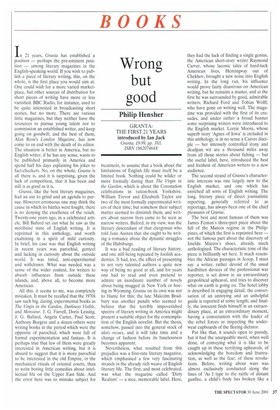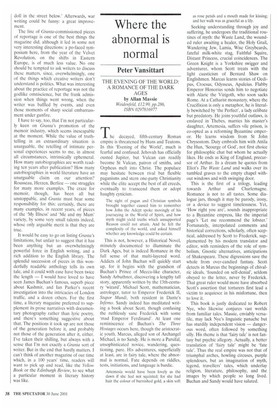Wrong but good
Philip Hen s her
GRANTA: THE FIRST 21 YEARS introduced by Ian Jack Granta, .f9.99, pp. 383, ISBN 186207464X In 21 years, Granta has established a position — perhaps the pre-eminent position — among literary magazines in the English-speaking world. If you wish to publish a piece of literary writing, this, on the whole, is the first place you would aim at. One could wish for a more varied marketplace, but other sources of distribution for short pieces of writing have more or less vanished. BBC Radio, for instance, used to be quite interested in broadcasting short stories, but no more. There are various little magazines, but they neither have the resources to pursue young talent nor to commission an established writer, and keep going on goodwill; and the best of them, Alan Ross's London Magazine, has now come to an end with the death of its editor. The situation is better in America, but no English writer, if he has any sense, wants to be published primarily in America and spend half his days explaining his jokes to fact-checkers. No, on the whole, Granta is all there is, and it is surprising, given the lack of competition, that it has been and still is as good as it is.
Granta, like the best literary magazines, had an axe to grind and an agenda to pursue. However erroneous one may think the cause in which its battles were fought, there is no denying the excellence of the result. Twenty-one years ago, in a celebrated article, Bill Buford set out what he saw as the moribund state of English writing. It is reprinted in this anthology, and worth examining in a spirit of mild curiosity. In brief, his case was that English writing in recent years was parochial, genteel and lacking in curiosity about the outside world. It was timid, anti-experimental and withdrawn. What was needed was a sense of the wider context, for writers to absorb influences from outside these islands, and, above all, to become more American.
All this, it seems to me, was completely mistaken. It must be recalled that the 1970s saw such big, daring, experimental books as The Virgin in the Garden, Darkness Visible, and Monsieur. J. G. Farrell, Doris Lessing, J. G. Ballard, Angela Carter, Paul Scott, Anthony Burgess and a dozen others were writing books in the period which were the opposite of parochial, which were full of formal experimentation and fantasy. It is perhaps true that few of them were greatly interested in American writing, but it is absurd to suggest that it is more parochial to be interested in the old Empire, in the mechanical rituals of oriental courts, than to write boring little comedies about intellectual life on the Upper East Side. And the error here was to mistake subject for treatment, to assume that a book about the limitations of English life must itself be a limited book. Nothing could be wilder or more formally daring than The Virgin in the Garden, which is about the Coronation celebrations in ration-book Yorkshire. William Trevor and Elizabeth Taylor are two of the most formally experimental writers of their time; but somehow their subject matter seemed to diminish them, and writers about narrow lives came to be seen as narrow writers. Buford, in my view, was the literary descendant of that clergyman who told Jane Austen that she ought to be writing a romance about the dynastic struggles of the Habsburgs.
It was a bad reading of literary history, and one still being repeated by foolish academics. It had, too, the effect of presenting to not very talented authors a quite new way of being no good at all, and for years one had to read and even pretend to admire an inordinate number of novels about being mugged in New York or hoeing in Wyoming. Granta on its own was not to blame for this; the late Malcolm Bradbury was another pundit who seemed to believe that the terribly impoverished spectre of literary writing in America might present a suitable object for the contemplation of the English novelist. But the thesis, somehow, passed into the general stock of idees recues, and it will take time and a change of fashion before its baselessness becomes apparent.
Nevertheless, what resulted from this prejudice was a first-rate literary magazine, which emphasised a few very fascinating strands in the already rich weave of English literary life. The first, and most celebrated, was what the magazine called 'Dirty Realism' — a nice, memorable label. Here, they had the luck of finding a single genius, the American short-story writer Raymond Carver, whose laconic tales of hard-luck American lives, Hemingway out of Chekhov, brought a new noise into English writing. In the long run, his influence would prove fairly disastrous on American writing, but he remains a master, and at the first he was surrounded by good, admirable writers, Richard Ford and Tobias Wolff, who have gone on writing well. The magazine was provided with the first of its crusades, and under rather a broad banner some surprising writers were introduced to the English market. Lorrie Moore, whose superb story 'Agnes of Iowa' is included in this anthology, is in no sense a Carver disciple — her intensely controlled irony and deadpan wit are a thousand miles away from all those stories about fishing — but the useful label, here, introduced the best and freshest of American writers to a new audience.
The second strand of Granta's characteristic interests was one largely new to the English market, and one which has enriched all sorts of English writing. The long, literary piece of direct journalistic reporting, generally referred to as reportage, has always been one of the chief pleasures of Granta.
The best and most famous of them was James Fenton's three-part piece about the fall of the Marcos regime in the Philippines, of which the first is reprinted here — not the famous part about the discovery of Imelda Marcos's shoes, already much anthologised. The characteristic tone of the piece is brilliantly set here. It much resembles the African passages in Scoop, I must say: a writer, rather devoid of the usual hardbitten devices of the professional war reporter, is set down in an extraordinary geopolitical upheaval, and tries to discover what on earth is going on. The hotel lobby is described in engaging detail; the conversation of an annoying and an unhelpful guide is reported at some length; and finally, the innocent finds himself in an extraordinary place, at an extraordinary moment, having a conversation with the leader of the rebel forces or inspecting the underwear cupboards of the fleeing dictator.
Put like that, it sounds open to parody, but it had the unarguable merit, when well done, of conveying what it is like to be caught up in these terrifying upheavals, of acknowledging the boredom and frustration, as well as the fear, of these revolutions. Before, writing about wars was almost exclusively conducted along the lines of 'As I type to the rattle of distant gunfire, a child's body lies broken like a doll in the street below.' Afterwards, war writing could be funny: a great improvement.
The line of Granta-commissioned pieces of reportage is one of the best things the magazine did, although it led in some not very interesting directions: a po-faced symposium here, from the year of the Velvet Revolution, on the shifts in Eastern Europe, is of much less value. No one should be tempted to ask writers to discuss these matters, since, overwhelmingly, one of the things which creative writers don't understand is politics. What was interesting about the practice of reportage was not the godlike omniscience, but the frank admission when things went wrong, when the writer was baffled by events, and even those moments of sharp social embarrassment under gunfire.
I have to say, too, that I'm not particularly keen on Granta's promotion of the memoir industry, which seems inescapable at the moment. While the value of truthtelling in an extraordinary situation is unarguable, the retelling of intimate personal experiences seems to me, in almost all circumstances, intrinsically ephemeral. How many autobiographies are worth reading ten years after publication? How many autobiographies in world literature have an unarguable claim on our attention? Rousseau, Herzen, Berlioz — one struggles for many more examples. The craze for memoir, though, has been all but unstoppable, and Granta must bear some responsibility for this: certainly, there are many examples, in recent years, of pieces of the 'My Illness' and 'Me and my Mum' variety, by some very small talents indeed, whose only arguable merit is that they are true.
It would be easy to go on listing Granta's limitations, but unfair to suggest that it has been anything but an overwhelmingly powerful force in English writing, and a rich addition to the English library. The splendid succession of pieces in this wonderfully readable anthology tells its own tale, and it could with ease have been twice the length — I would have loved to have seen James Buchan's famous, superb piece about Kashmir, and Ian Parker's recent investigation into the intricacies of London traffic, and a dozen others. For the first time, a literary magazine preferred to supplement its prose narratives with documentary photography rather than lyric poetry, and there's something suggestive about that. The positions it took up are not those of the generation before it, and probably not those of the generation after it, either. I've taken their shilling, but always with a sense that I'm not exactly a Granta sort of writer. But in the end that hardly matters. I can't think of another magazine of our time which, in a 100 years' time, readers will want to pick up and read, like the Yellow Book or the Edinburgh Review, to see what a particular moment in literary history was like.











































































 Previous page
Previous page